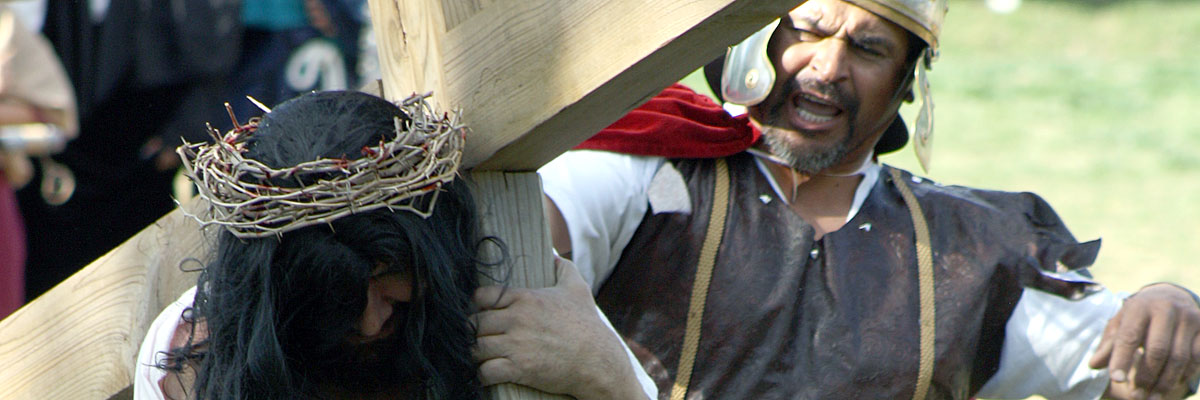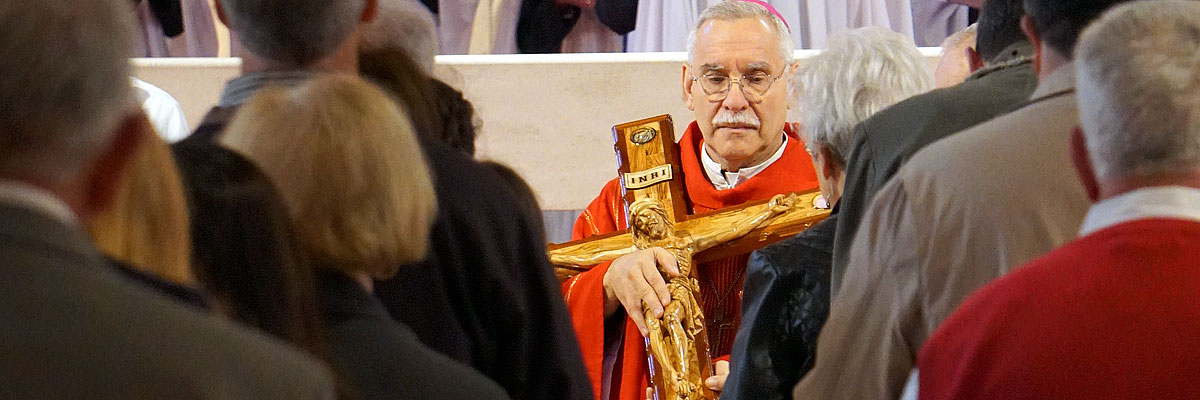Official Website of the
Catholic Diocese of Little Rock
Good Friday Passion of the Lord 2014
Published: April 18, 2014
Bishop Anthony B. Taylor preached the following homily during the Good Friday Service at the Cathedral of St. Andrew in Little Rock on Friday, April 18, 2014.

Bishop Taylor
After WWII the question arose regarding how to reintegrate Germany into the family of nations. Those who survived the war were deeply repentant, but who had standing to forgive them? Some Holocaust survivors insisted that while there were things that good Germans could do to atone for the evils perpetrated by others of their nation and thereby establish a positive relationship with the new state of Israel, forgiveness itself -- strictly speaking -- was not possible because it is for the victims to forgive and those who had suffered the most were dead, their mouths closed forever.
The victorious Allies could look for a way to move forward, but we could not forgive a genocide that we ourselves did not suffer.
On Good Friday Jesus addresses the need for atonement and forgiveness on a universal scale. He was the most innocent victim imaginable. Given current usage, you may be surprised to know that in the Bible, Holocaust is actually a positive word and refers to a voluntary sacrifice that was totally destroyed on the altar of the Temple. The literal meaning of the word is "totally burnt up," for instance on the Day of Atonement offered for the forgiveness of the sins of individuals and the people as a whole.
He was the victim of my sin, your sin, the sins of his followers and of his adversaries
Genocide is another type of total destruction and given the Nazi's practice of cremating, totally burning up, the bodies of their victims, we now have the modern use of the word Holocaust to describe a horrific evil that is totally repugnant to God and to humanity. But this new use of the word is unfortunate because the totally consumed offerings in the Temple were understood to be pleasing to God and served to atone for sin. But even here the question did arise about how the death of an animal could possibly secure this forgiveness--it was a victim all right, but probably not in a forgiving mood at the point of death, when its mouth was closed forever.
But not so Jesus! He was the victim of my sin, your sin, the sins of his followers and of his adversaries, culminating in a wanton killing in every way repugnant to God and humanity, but his was a holocaust of a different sort in 3 respects: 1) Unlike the Allies who did not have standing to speak words of forgiveness on behalf of the victims of genocide, Jesus did have standing to forgive because he was the victim of the sins of all of humanity--and he did so: "Father, forgive them for they know not what they do." 2) And like the sacrifices in the Temple, Jesus died in atonement for sin, but unlike the animals sacrificed, he was also the Son of God--the Second Person of the Blessed Trinity, and so his death really could secure forgiveness.
He was both priest and victim: 1) he was the priest who offered the sacrifice to his Heavenly Father in atonement for our sins and at the same time 2) he was the victim who laid down his life voluntarily--submitted to his own total physical destruction. Jesus did this in fulfillment of his Father's plan to redeem us from slavery to sin...breaking the power of death and everything else that keeps us bound in unhealthy ways. And as we shall discover on Easter Sunday, not only was Jesus' own self and ministry vindicated through his triumph over death and the grave, his sacrifice was effective in securing the liberation for which he died: this atonement, this reconciliation, this redemption, this expiation, this freedom, this otherwise unattainable forgiveness, this fresh start for us as well!






